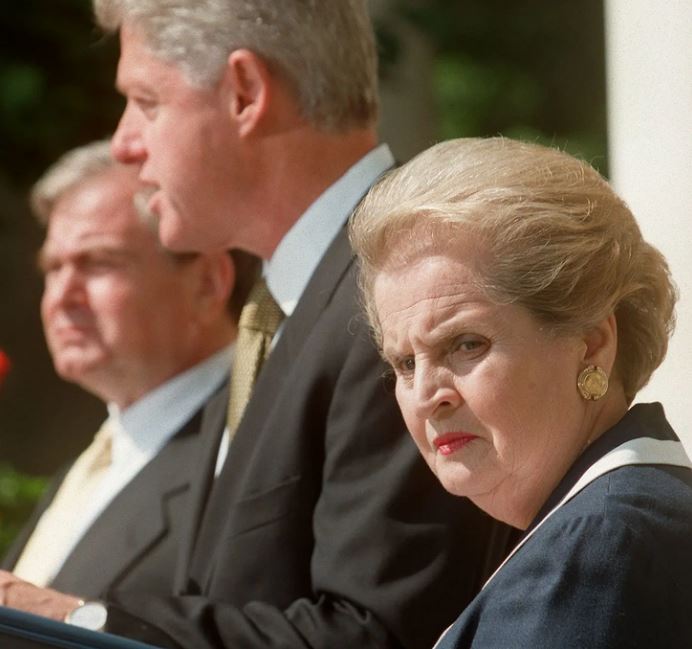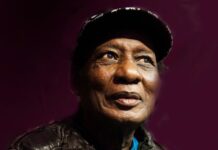
Madeleine K. Albright, a child of Czech refugees who fled from Nazi invaders and Communist oppressors and then landed in the United States, where she flourished as a diplomat and the first woman to serve as secretary of state, died on Wednesday in Washington. She was 84.
The cause was cancer, her daughter Anne said.
Enveloped by a veil of family secrets hidden from her for most of her life, Ms. Albright rose to power and fame as a brilliant analyst of world affairs and a White House counselor on national security. Under President Bill Clinton, she became the country’s representative to the United Nations (1993-97) and secretary of state (1997-2001), making her the highest-ranking woman in the history of American government at the time.
Ms. Albright visited American troops at the Tuzla Air Base in Bosnia in 1998.
ImageMs. Albright visited American troops at the Tuzla Air Base in Bosnia in 1998.
Ms. Albright visited American troops at the Tuzla Air Base in Bosnia in 1998.Credit…Amel Emric/Associated Press
It was not until after she became secretary of state that she accepted proof that, as she had long suspected, her ethnic and religious background was not what she had thought. She learned that her family was Jewish and that her parents had protectively converted to Roman Catholicism during World War II, raising their children as Catholics without telling them of their Jewish heritage. She also discovered that 26 family members, including three grandparents, had been murdered in the Holocaust.
With her father, a diplomat, probably facing execution, the family’s odyssey from a Europe on the brink of World War II to safety in America took 10 years and two escapes to London. The first came as Nazi troops invaded Czechoslovakia in 1939, and the second came after the family’s postwar repatriation, when Czech Communists with Soviet support overthrew the government of Czechoslovakia in 1948.
In America, Madeleine Korbel was a gifted student, married into the wealthy Albright-Medill newspaper family and wrote many books and articles on public affairs. She also climbed the ranks of the Democratic Party to pinnacles of success as a counselor to President Jimmy Carter and as a foreign policy adviser to three presidential candidates: former Senator Walter F. Mondale of Minnesota in 1984, Gov. Michael S. Dukakis of Massachusetts in 1988 and Mr. Clinton in 1992. She was also the campaign foreign policy adviser to Geraldine Ferraro, the first woman to run for vice president.
She was largely unknown until Mr. Clinton took office as president in 1993 and named her chief delegate to the United Nations. Over the next four years, she became a tough advocate for the global interests of the United States. But she and Mr. Clinton clashed repeatedly with Secretary General Boutros Boutros-Ghali over peacekeeping operations in Somalia, Rwanda and the Bosnian civil war.
Mr. Clinton had heartily endorsed humanitarian and peacekeeping operations when American troops entered Somalia in 1992 to feed starving victims of civil war. But when 18 American troops were slain by the forces of a Somali warlord in 1993 and the nation saw television images of a dead helicopter pilot dragged through the streets of Mogadishu, Mr. Clinton retreated from politically risky United Nations missions.
Thus the U.S., like most other member states, held back from aiding a small force of U.N. peacekeepers when Rwanda descended into genocide and rape in 1994. As many as a million people were killed. Ms. Albright put the onus on Mr. Boutros-Ghali, calling him “disengaged.” But Mr. Boutros-Ghali said he had been rebuffed when he tried to see the president to seek support.
Years later, Mr. Clinton apologized for America’s inaction in Rwanda. In a 2003 memoir, “Madam Secretary,” Ms. Albright wrote, “My deepest regret from my years in public service is the failure of the United States and the international community to act sooner to halt these crimes.” It was a regret she repeated, in much the same words, in an interview for this obituary.
Mr. Boutros-Ghali’s frustration over the Clinton administration’s pattern of voting for tough Security Council resolutions and then refusing to support actions on the ground was most notable in the 1992-95 civil war in Bosnia, a conflict of ethnic and religious differences that led to displaced populations, massacres, rapes and “ethnic cleansing” campaigns against Muslims and other minorities.
The Security Council deplored the atrocities, but its peacekeepers were unable to subdue the fighting. Aside from limited airstrikes, the United States did not substantively intervene, although the Clinton administration eventually mediated the conflict.
In 1996, the Security Council voted overwhelmingly to give Mr. Boutros-Ghali a second term. But Ms. Albright, in her last days as the American delegate, cast a decisive veto, her prerogative as one of the five permanent Council members. Mr. Boutros-Ghali called the veto an assault on his integrity and said he had been hounded out of office by Mr. Clinton for election-year political gain.
Days after beginning his second term, Mr. Clinton nominated Ms. Albright as secretary of state. She was unanimously confirmed by the Senate (99-0) and soon made her first official trip, not to a foreign capital but to Texas, where she spoke at Rice University — determined, she said, to take United States foreign policy straight to the American people.
“As secretary, I will do my best to talk about foreign policy not in abstract terms, but in human terms and bipartisan terms,” she said. “I consider this vital because in our democracy, we cannot pursue policies abroad that are not understood and supported here at home.”
She then embarked on a nine-nation world tour, with stops in Rome, Paris, London, Brussels, Bonn, Moscow, Tokyo, Seoul and Beijing. It was a getting-to-know-you circumnavigation that showed off her grasp of issues, her language skills and her centrality as Mr. Clinton’s chief foreign policy maker and spokeswoman. She generated excitement everywhere, and appeared to have a wonderful time.
“Everybody has their own style, and mine is people to people,” she said on a walk in Rome. “I’m trying mine, and I am enjoying it.”
A Test in Iraq
As Mr. Clinton’s top diplomat during relatively peaceful years, Ms. Albright dealt with regional conflicts in Bosnia and Herzegovina, Kosovo, Haiti, Northern Ireland and the Middle East, but no wide wars. She promoted the expansion of NATO into the former Soviet bloc nations of Eastern Europe and defended continued economic sanctions against Iraq.
A crisis on Ms. Albright’s watch developed in late 1997 and early 1998, after Iraq’s president, Saddam Hussein, blocked the access of United Nations inspectors to sites where Iraqi chemical and biological weapons of mass destruction were believed to have been hidden, in violation of a Security Council resolution passed at the end of the 1991 Persian Gulf war.
After months of warnings and an American military buildup in the region, Ms. Albright and Mr. Clinton threatened to launch devastating aerial attacks on Iraq unless the sites were reopened to inspection. “Iraq has a simple choice,” Ms. Albright said in a public warning to Hussein. “Reverse course or face the consequences.”
In an 11th-hour move to prevent war, the United Nations secretary general, Kofi Annan, carrying final terms drawn up by Ms. Albright, flew to Baghdad and secured the Iraqi leader’s agreement to restore unrestricted access to the sites by U.N. weapons inspectors and diplomatic chaperones. In December 1998, the United States and Britain bombed scores of Iraqi military targets and research installations to degrade Iraq’s ability to manufacture weapons of mass destruction.
Ms. Albright championed NATO bombings in Kosovo that halted attacks on ethnic Albanians by Yugoslavian forces in 1999. She also promoted ratification of the Kyoto Protocol on climate change. But American diplomats in Africa said she had failed to heed warnings that foreshadowed truck bombings in 1998 that killed 224 people at the American Embassies in Nairobi, Kenya, and Dar es Salaam, Tanzania.
Throughout her tenure, Ms. Albright opposed the proliferation of nuclear weapons in rogue states. But on a visit to North Korea’s leader, Kim Jong-il, in October 2000, she was unable to strike a deal to limit his country’s ballistic missile program before Mr. Clinton left office.
Still, her performance as secretary of state won high marks from career diplomats abroad and ordinary Americans at home. Admirers said she had a star quality, radiating practicality, versatility and a refreshingly cosmopolitan flair. She spoke Czech, Polish, French and Russian.
Unlike her immediate predecessor, Warren Christopher, a reserved foreign policy wonk who saw his role as Mr. Clinton’s diplomatic lawyer, Ms. Albright was an aggressive advocate of Clinton policies. Conscious of television cameras but remarkably natural in public, she strolled through crowded capitals (with discreet security guards) like a tourist with free time on her hands.
She was a diminutive presence with an assured style: impeccably tailored and perfectly coifed, with touches of gold or pearl in her brooches, an amused smile for the cognoscenti and eyes that missed nothing. In meetings with foreign diplomats, colleagues said, she was firm but flexible, prepared to move beyond her talking points and to engage her counterparts in frank oval-table bargaining.
“So often in diplomacy, it’s all set pieces,” an aide told The New York Times. “You say this and I say that and the meeting ends and nothing happens. But she engages. And in contrast to nearly all her predecessors, she doesn’t hide policy differences, but brings them out, and speaks very directly of them, saying things like ‘Here’s what we agree on, here’s what we don’t. Let me tell you what the real problem is.’”
Ms. Albright with her predecessor, Warren Christopher, at her confirmation hearing in 1997.
Image
Ms. Albright with her predecessor, Warren Christopher, at her confirmation hearing in 1997.
Ms. Albright with her predecessor, Warren Christopher, at her confirmation hearing in 1997.Credit…Stephen Crowley/The New York Times
She courted the public, too, with speeches that made arcane foreign policy seem exciting and even meaningful to Americans, whose anxiety about a Soviet nuclear attack had faded, although the age of terrorism was right around the corner. Coming after decades of Cold War tensions, her relaxed pitches made many Americans feel prouder, or at least better, about their nation’s role in the world.
After Ms. Albright stepped down as secretary of state in 2001, there was speculation that she might pursue a political career in the Czech Republic. Vaclav Havel, the writer and former dissident who was the republic’s first president from 1993 to 2003, suggested publicly that she might succeed him. Ms. Albright said she was flattered but not interested.
In 2008, Ms. Albright supported her longtime friend Hillary Clinton for the Democratic presidential nomination, and then supported Barack Obama, who won the nomination and the presidency, appointing Mrs. Clinton as his first-term secretary of state.
In 2016, Ms. Albright again supported Mrs. Clinton for the presidency. At a campaign stop for the New Hampshire primary, Ms. Albright told a crowd, “There’s a special place in hell for women who don’t help each other.” The line went viral. She had used it previously without objections. But some voters now found it offensive, taking it as a rebuke to younger women who supported a Clinton rival, Senator Bernie Sanders of Vermont.
An ardent feminist, Ms. Albright apologized in an opinion article in The Times. “I did not mean to argue that women should support a particular candidate based on gender,” she wrote. “But I understand that I came across as condemning those who disagree with my political preferences. If heaven were open only to those who agreed on politics, I imagine it would be largely unoccupied.”
Fabricated Memories
Madeleine Albright was born Marie Jana Korbelova in Prague on May 15, 1937, the oldest of three children of Josef and Anna (Speeglova) Korbel. Her father was a press attaché in the Czech Embassy in Belgrade, Yugoslavia, and had worked for Czechoslovakia’s first democratic president, Tomas G. Masaryk, who retired in 1935, and his successor, Edvard Benes.
Hitler’s annexation of the Sudetenland and his later invasion of Czechoslovakia forced Benes to flee to London. After 10 days in hiding, Mr. Korbel, targeted for execution by the Nazis, followed with his family and worked for the Benes government-in-exile.
He and his wife had two more children, Katherine and John. Like millions of Londoners, the family endured the Luftwaffe air raids of 1940-41. Ms. Albright recalled nights in shelters and hiding under a steel table at home as bombs fell.
With the outcome of the war in doubt and the fate of Jewish families in a postwar Nazi Europe too horrifying to contemplate, the Korbels, in a wrenching decision, converted to Roman Catholicism in 1941. They had their children baptized, observed Catholic rites and holidays and, to preserve their assumed identities and possibly their lives, fabricated a family history of Christian memories.
Ms. Albright (third from left, sitting) and other unidentified children in Serbia around 1941.
“My parents talked about how they met, and how they were high school sweethearts,” Ms. Albright recalled decades later after learning the truth. “They talked about getting ready for various holidays, for Easter and Christmas.” She recalled being “a very serious Catholic” who loved the Virgin Mary and “played a priest — I was already playing male roles.”
After the war, the Korbels returned to Prague. Mr. Korbel became the Czech ambassador to Yugoslavia, and his family joined him in Belgrade. Ms. Albright recalled her first diplomatic experiences, when she was 8 and accompanied her father to the Belgrade airport to meet visiting dignitaries.
“I was a little girl in Czech national costume when foreign visitors came to Belgrade,” she said in the obituary interview. “I greeted them and gave them flowers.”
Worried about exposing their daughter in Belgrade state schools to Marxist indoctrination, however, the Korbels sent Marie to a private school in Switzerland and changed her name to Madeleine.
When Communists seized power in Prague in 1948, Mr. Korbel was forced to resign and again became a wanted man. Unwilling to return to Prague, he joined a United Nations commission and sent his family first to London and then on to America. The family was reunited in New York, was given political asylum and settled in Denver, where Mr. Korbel became a professor at the University of Denver.
At the Kent School for Girls, Madeleine Korbel founded an international relations club and graduated in 1955. At Wellesley College, she studied political science, edited the school newspaper and graduated with honors in 1959. She also became an American citizen in 1957.
On a summer internship at The Denver Post, she met Joseph Medill Patterson Albright, the grandson of Joseph Medill Patterson, who founded The Daily News of New York, and the nephew of Alicia Patterson, the founder and editor of Newsday on Long Island.
In 1959, Ms. Korbel married Mr. Albright and converted to Episcopalianism. The couple had three daughters, the twins Alice and Anne and Katie, and were divorced in 1983. In addition to Anne, Ms. Albright is survived by her other two daughters, along with her sister, Kathy Silva; her brother, John Korbel; and six grandchildren. She lived in Washington.
Introduction to Politics
In 1962, Ms. Albright began postgraduate work at the Paul H. Nitze School of Advanced International Studies, a Washington-based division of Johns Hopkins University. At Columbia University, she earned a Russian certificate and a master’s degree in international affairs in 1968 and a doctorate in 1976.
She got into politics in 1972, raising funds for the losing presidential campaign of Senator Edmund Muskie of Maine, a family friend, who named her his legislative aide. After Jimmy Carter’s 1976 presidential victory, Zbigniew Brzezinski became national security adviser and recruited his former Columbia student, Ms. Albright, as congressional liaison for Mr. Carter’s National Security Council.
In 2001, she founded what is now the Albright Stonebridge Group, an international consulting firm, and in 2005 she founded Albright Capital Management, focusing on emerging markets. For years, she lived in Georgetown and taught at Georgetown University and was a director of the Council on Foreign Relations. In 2012, President Barack Obama awarded her the Presidential Medal of Freedom, the nation’s highest civilian honor.
At a 2006 concert at the Kennedy Center presented by the Thelonious Monk Institute of Jazz, Ms. Albright received an award in recognition of her support of the institute, jazz education and the role jazz plays in diplomatic efforts worldwide. She also took a turn at the drums.
Besides her 2003 memoir, Ms. Albright wrote “The Mighty and the Almighty: Reflections on America, God and World Affairs” (2006), “Memo to the President-Elect: How We Can Restore America’s Reputation and Leadership” (2008), “Read My Pins: Stories From a Diplomat’s Jewel Box” (2009) and “Prague Winter: A Personal Story of Remembrance and War, 1937-1948” (2012). Her last book, “Hell and Other Destinations: A 21st-Century Memoir,” written with Bill Woodward, was published in 2020.
Her book “Fascism: A Warning” (2018, also with Bill Woodward) put President Donald J. Trump among the world’s autocrats. In a review for The Times, Sheri Berman wrote, “Democracy’s problems can, Albright assures us, be overcome — but only if we recognize history’s lessons and never take democracy for granted.”
In the ’90s, Mrs. Albright began receiving letters from Europe with sketchy information about her family background. Then, in 1997, The Washington Post published a profile of the new secretary of state reporting that her parents had been Jews who converted to Catholicism and created a fictional past to protect their children from the Nazis.
She accepted the evidence as the truth and told The Times: “I think my father and mother were the bravest people alive. They dealt with the most difficult decision anyone could make. I am incredibly grateful to them, and beyond measure.”
credit: nytimes.com


















































![Morocco knock out Spain on 3-0 penalties to reach FIFA World Cup 2022 quarter-final, Morocco vs Spain (0-0) (3-0) [Video]. Morocco knock out Spain on 3-0 penalties](https://ghanaregions.com/wp-content/uploads/2022/12/Watch-Morocco-vs-Spain-0-0-and-3-0-penalties-218x150.jpg)



































